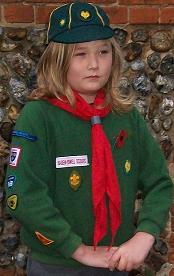| Wolf Cubs | |||
|---|---|---|---|
| Owner | Baden-Powell Scouts' Association | ||
| Age range | 8–10.5 | ||
| Country | United Kingdom | ||
| |||
Wolf Cubs, usually referred to as Cubs, is the 3rd youngest section of Scouting operated by the Baden-Powell Scouts' Association, following on from the Beaver Scouts section. The core age range for Wolf Cubs is eight to eleven, though exceptions can be granted. Individual sections of Wolf Cubs, known as a Pack, are run by the local Scout Group. After reaching the age of ten and a half, a Wolf Cub may move on to Scouts.





